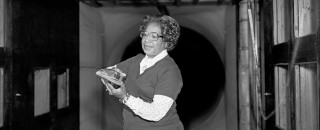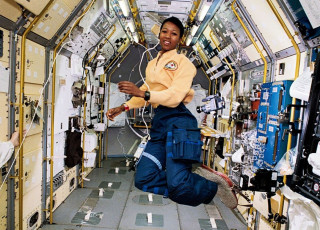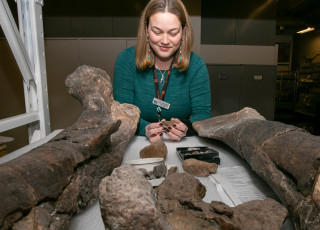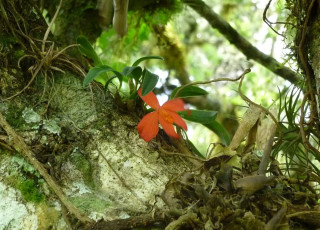Women Bust Science Stereotypes
Aerospace engineer Mary Jackson is among the many women who have continued to change science. Credit: NASA
By Riley Black
The most skilled fossil hunters of all time were women. Nearly two centuries ago, along England's southern beaches, Mary Anning and the Philpot sisters - Elizabeth, Mary, and Margaret - combed the island's Jurassic Coast for fossils of ichthyosaurs, ammonites, pterosaurs, and other prehistoric creatures. They taught each other, excavating, sketching, and describing their finds in detail. Mary Buckland even illustrated some of these finds, preserving them in ink for generations of paleontologists. But we have only recently come to celebrate these trowelblazers. In their time, and for an unfortunately long stretch afterwards, women were denied entry into formal scientific circles or had their ideas stolen, disregarded, or forgotten. The idea that science is the story of men making great accomplishments is a stereotype society created and perpetuated, leaving us to rediscover and celebrate how women have been essential to science from the outset.
Thankfully, science - be it paleontology or physics - is not like it was in the early 19th century. "We've come a long way," says NHMU Curator of Learning Sciences Lynne Zummo. "I think now more than ever in our society, girls and young women have more opportunities, encouragement, and structures to pursue science." Programs like Girls Who Code, Women in Engineering Proactive Network, STEM and Gender Advancement, and more have been working tirelessly to open doors for women in science and help change science's culture. There are more avenues for support than there have ever been, all helping women's expertise, perspectives, and voices be heard.
But this doesn't mean that sexism in science is extinct. The UNESCO Institute for Statistics reports that women make up less than 30% of the world's scientific researchers. That's partly because girls and women in college are often discouraged from pursuing science due to stereotypes about who scientists are, not to mention the "leaky pipeline" between women who do earn science degrees and those who are able to find permanent work in their field of study. "Look at positions of leadership in science," Zummo says. "From university departments to major scientific insitutions, leadership positions tend to be dominated by men." The disparity even goes down to the dynamics of classrooms and meetings. "There's plenty of research that shows even in majority women science classes, men do more talking and take up more air time." The situation can be even harder for women who are Black, transgender, come from an underclass background, or are otherwise at the intersection of other systemic forms of discrimination.
Women have made so much progress in science, not just in terms of representation but in altering what we thought we understood about our universe. Lynn Margulis forever changed biology by suggesting that mitochondria were once free-living cells that became enclosed within other cells through symbiosis. Mary Dawson opened up a whole near world of paleontology in the Arctic. Astronauts wouldn't have gotten very far without the engineering brilliance of Mary G. Ross and Mary Jackson. Rosalind Franklin discovered the structure of DNA. Lynn Conway revolutionized the computer industry. And that's not even touching all the research, discoveries, and insights that women in science are generating even at this very moment.
We would know so little about our universe without women scientists, and pioneers in every single field are still pushing for change. We can both celebrate how far we've come while still acknowledging how far we have yet to go. "Seeing people who look like you in positions of power and as a scientist is really important," Zummo notes, "but if there aren't structures in place that actively work against decades of unfair dynamics, representation is not enough." In a study published just last year, women in STEM were found to make about $22,500 less each year than men in the same positions. The struggle is at every institution, in every discipline, often falling to women who are already emotionally taxed from breaking barriers in their fields.
We certainly have much to celebrate this Women's History Month, and those celebrations will help inspire more of the change we wish to see. Science is a process, a never-ending conversation between us and nature. Who we are, where we come from, and how we learn about the world influence what and how we study the universe, making a diversity of perspectives essential to testing and self-correcting. What we do today will help shape tomorrow. "My students were the ones who helped me realize that I wanted to design better science learning experiences for them," Zummo says. "The possibility of better serving them, and future science students to come, is what drove me to pursue a PhD in science education."
Riley Black is the author of The Last Days of the Dinosaurs, Skeleton Keys, My Beloved Brontosaurus, and is a science writer for the Natural History Museum of Utah, a part of the University of Utah in Salt Lake City. Our mission is to illiminate the natural world and the place of humans within it. In addition to housing outstanding exhibits for the public, NHMU is a research museum. Learn more.



